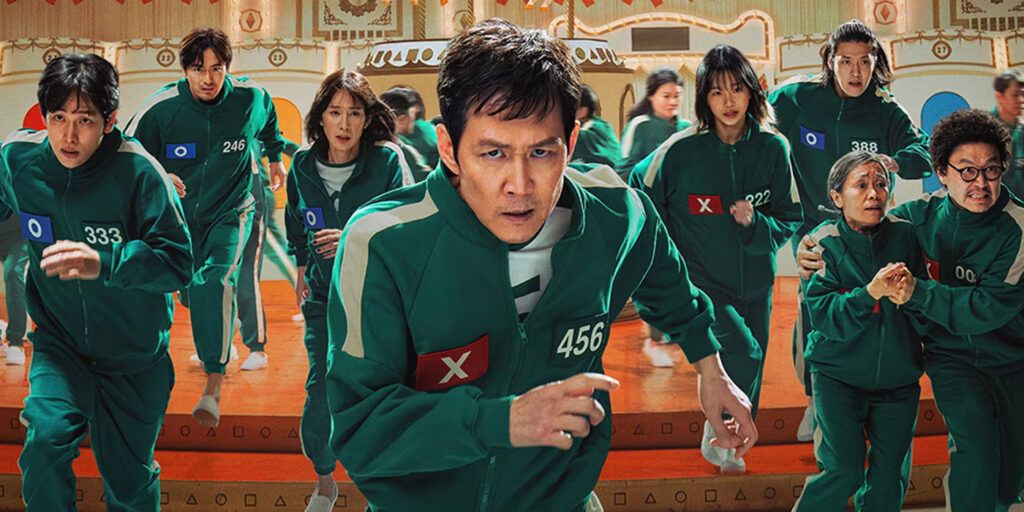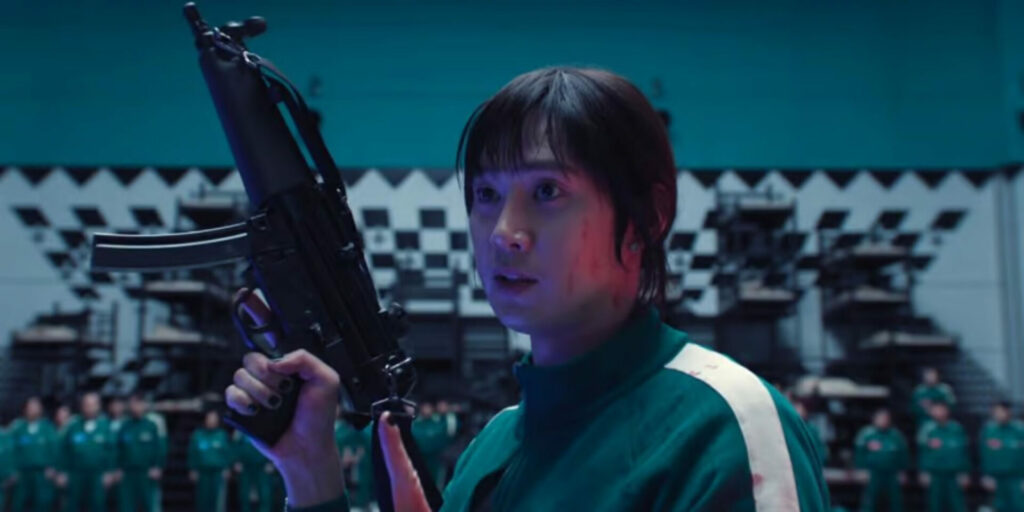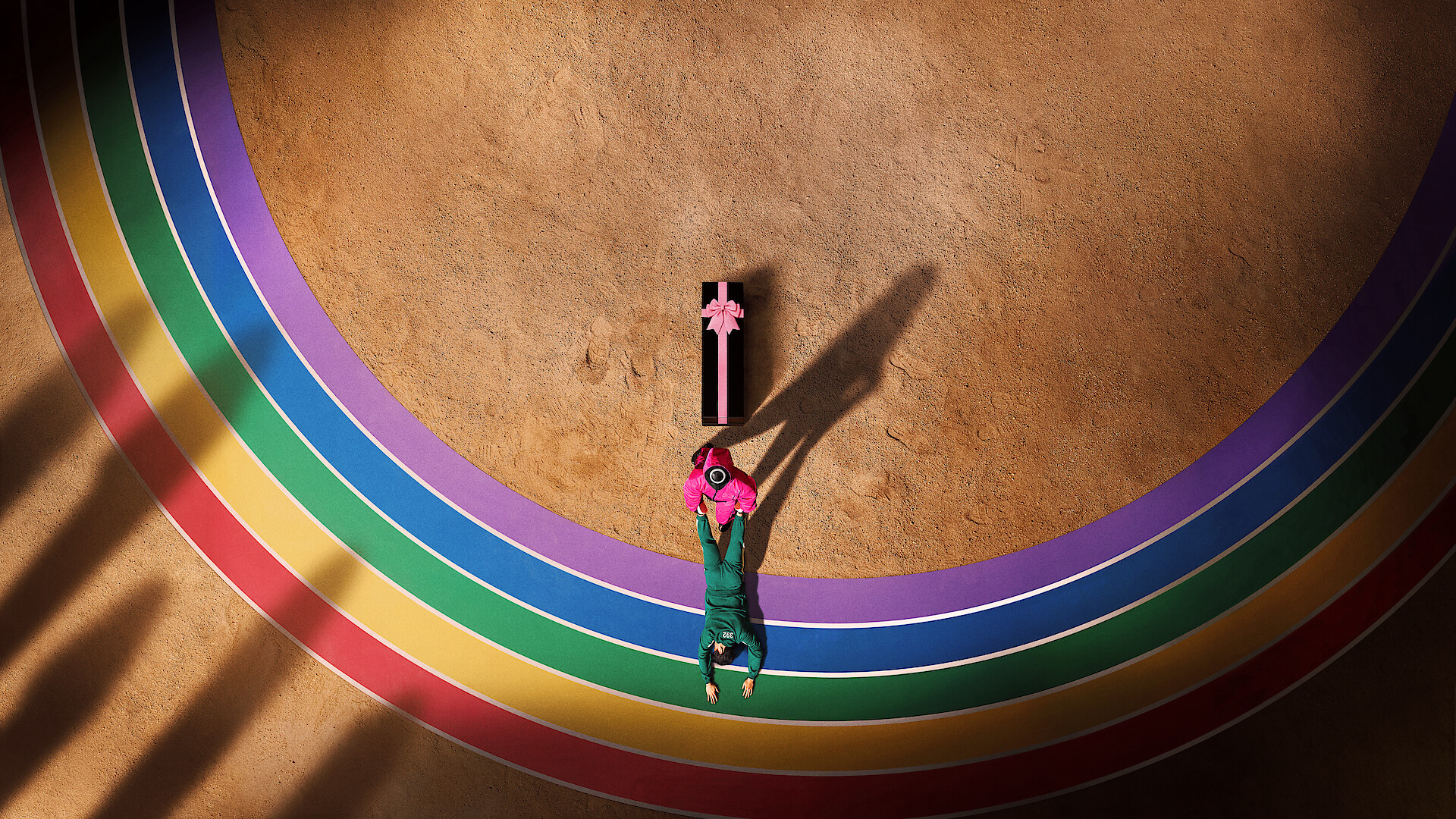In a dark and dramatic twist of irony, Squid Game, a blatant anti-capitalist parable, has become Netflix’s biggest commodity. As if the executives weren’t at all paying attention to the show’s message, Netflix’s response to the series’ success was to create a real-life gameshow version and a mobile game. And the most damning part: audiences lap it up. From what I can gather in interviews, creator Hwang Dong-hyuk seems a little bitter, and I don’t blame him. Underpaid, pushed into writing/directing more seasons, and his show’s messages ignored for the more sensational aspects somehow manages to both dismiss and prove his points on society simultaneously. With the show back for a recent second season, and soon third and final season, I want the narrative of Squid Game itself to play with its real world reception.
I’m hoping the show ends in an especially dark and meta way. That the conversation about the show becomes the series’ final point; the exclamation mark on its three-season manifesto. The series could end on a question and its unsettling answer: what if the games were exposed? The truth revealed, the darkness illuminated, Gi-hun seemingly triumphant, only to find that the world does not care. In fact, people like the idea. In a cruel meta twist, and a final statement on the darkness of society, the games could become televised, streamed on Netflix, for a hungry, unsympathetic viewership who have lost sight of decency and morals.
The great evil of the series is the institution and we must never lose sight of this. The powers enforcing the paradigm, whether the government of the outside world or the controllers on the island. They keep people poor, forcing them to take extreme measures, giving them no other choice or outlet. That is still true in the second season, yet more accountability is placed on those within the system who refuse to acknowledge another way. Seong Gi-hun tries to help these people but few listen. They keep on voting and playing for greed. Even having someone explain the evil that is happening, how people are being manipulated, does little to change the microcosm of society on the island. Are they – we – beyond redemption?

Squid Game ending with a dark, cynical, nihilistic perspective on humanity didn’t feel right with the first season yet watching the second I couldn’t help but feel that’s the direction the show could be heading: futility. The second season ended in a dark place, which could just be classic ‘end of act 2’ low point, but perhaps could continue and hint at the depressing dénouement to come. Season two delivered a solid ending, if one can call it an ending at all, though perhaps is the weakest episode of the bunch. The breakout felt very Andor, though with a firefight that went on a little too long with characters clad in plot armour. I wish there was a little more conclusion, some extra beat or reveal with the Front Man or guard 011, but most of my issues are shallow and the deeper ideas in the episode, and season, are strong.
There are already some meta aspects that trickled into the second season, perhaps as a response to the reaction of the first season. The crypto influencer MG Coin and rapper Thanos, whose entire schtick is ripping off another creative property to get rich, speaks of those insufferable internet personalities who copied Squid Game for content, again missing the actual point of the show. Some players seem to be skewing more towards those often seen on reality television, so maybe that is where the games are going within the story. Completely vacuous, desperate people taken advantage of by corporations producing lowest common denominator rubbish showcasing the worst of the human condition. People who willingly have their dignity destroyed because rich people wave some money in their face. It’s disgusting. Yet people watch it.
The show’s themes are delivered with extra emphasis in the second season, perhaps in response to so many people, including Netflix apparently, missing them the first time round. I didn’t like the structure of the fifth episode immediately but now I think it’s the season’s best. An instalment which literally puts the vote and the interpersonal drama as the centrepiece, including Gi-hun’s friend finally managing to coax some humour and life out of the protagonist in the season’s best scene. The end of one game at the start, the beginning of the next at the end, with the real drama dominating the bulk of the episode, exploring the reasons why people want to keep playing. And not just the obviously bad people but the good and honest people who feel they have no other choice, too.

I really liked trans character Cho Hyun-ju adding another example of the way society oppresses, offering a new motivation for needing the money: to escape to somewhere more understanding. Yet she betrays new friends while doing so, voting to continue, keeping the ‘good’ characters from seeming too virtuous. They are corrupted by the system as much as anyone, to the point they are wishing for the death of others. The system keeps them fighting amongst themselves rather than the oppressors. And sadly, shamefully, at the end, most players refused to rebel, opting to sit tight and wait for the games to continue. The domination of spirit complete and perhaps irreparably so.
There are some people, perhaps a lot, who watch Squid Game just for the games. Because they enjoy the extreme violence, missing the themes and ideas while doing so, like those who watched The Sopranos as a ‘tits and hits’ show, cheering on Tony, rather than paying attention to the final season where it was highlighted just how despicable everybody was. But we’re all guilty of this to an extent. I’m not delivering a holier-than-thou perspective. I acknowledge that what is happening in the show is bad yet I still watch it for entertainment, because it is entertaining. I can wax poetic about the voting scenes but I also like watching people get shot and creatively killed and the tension of the games. The show is in a position, moving into its final season, of playing with this idea.
Squid Game has always been an exposé of society so why not double down on that and point the mirror not just at our society but directly at the viewer in the show’s final moments. A dark, meta ending of the games being televised and the world grabbing some popcorn.








